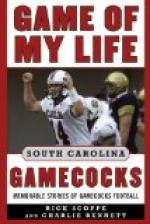The fuses of many of these shells fired on Port Sumter did not burn in time to cause the shells to burst before falling. Now as the shells fell on the rampart of the fort instead of falling and bursting on the stone, they buried themselves harmlessly in the sand, which put out the fuse and also kept them from bursting.
But while the destruction of life was lessened by the sand, it was fully made up by the hand of that brute, the overseer. God only knows how many negroes he killed in Port Sumter under the shadow of night. Every one he reached, while forcing the slaves back into working position after they had been scattered by the shells, he would strike on the head with the piece of iron he carried in his hand, and, as his victim fell, would cry out to some other negro, “Put that fellow in his box,” meaning his coffin.
Whether the superior officers in Fort Sumter knew that Deburgh was killing the negroes off almost as fast as the shells from Fort Wagner, or whether they did not know, and did not care, I never have learned. But I have every reason to believe that one of them at least, namely, Major John Johnson, would not have allowed such a wholesale slaughter, had he known. On the other hand I believe that Capt. J.C. Mitchell was not only mean enough to have allowed it, but that he was fully as heartless himself.
Whatever became of Deburgh, whether he was killed in Fort Sumter or not, I never knew.
OUR SUPERIOR OFFICERS.
The two officers in command of Fort Sumter in July of 1864 were Capt. J.C. Mitchell, and Major John Johnson.
Major Johnson was as kind, gentle, and humane to the negroes as could have been expected.
On the other hand, the actions of Capt. Mitchell were harsh and very cruel. He had a bitter hatred toward the Yankees, and during the rain of shells on Fort Sumter, he sought every opportunity to expose the negroes to as much danger as he dared.
I remember that one night Capt. Mitchell ordered us outside of Fort Sumter to a projection of the stone-bed upon which the Fort was built, right in front of Fort Wagner. At that place we were in far greater danger from the deadly missiles of the Union forces than we were exposed to on the inside of Sumter, and I could see no other reasons for his ordering us outside of the fort that night than that we might be killed off faster.
It seems that during the incessant firing on Fort Sumter the officers held a consultation as to whether it was not best to evacuate the fort. It was at this time that it was rumored,—a rumor that we had every reason to believe,—that Capt. Mitchell plotted to lock us negroes up in our quarters in Sumter, known as the Rat-hole; and put powder to it and arrange it so that both the negroes and the Yankees should be blown up, when the latter should have taken possession after the evacuation of the fort by the Confederates.




